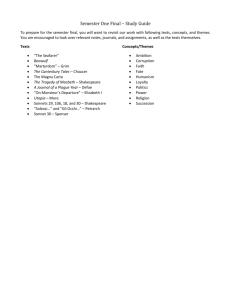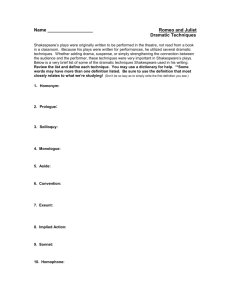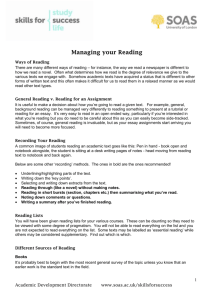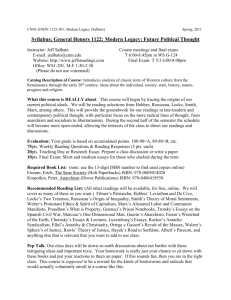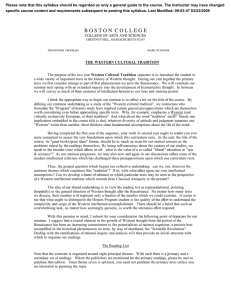Laney College, spring 2005
advertisement
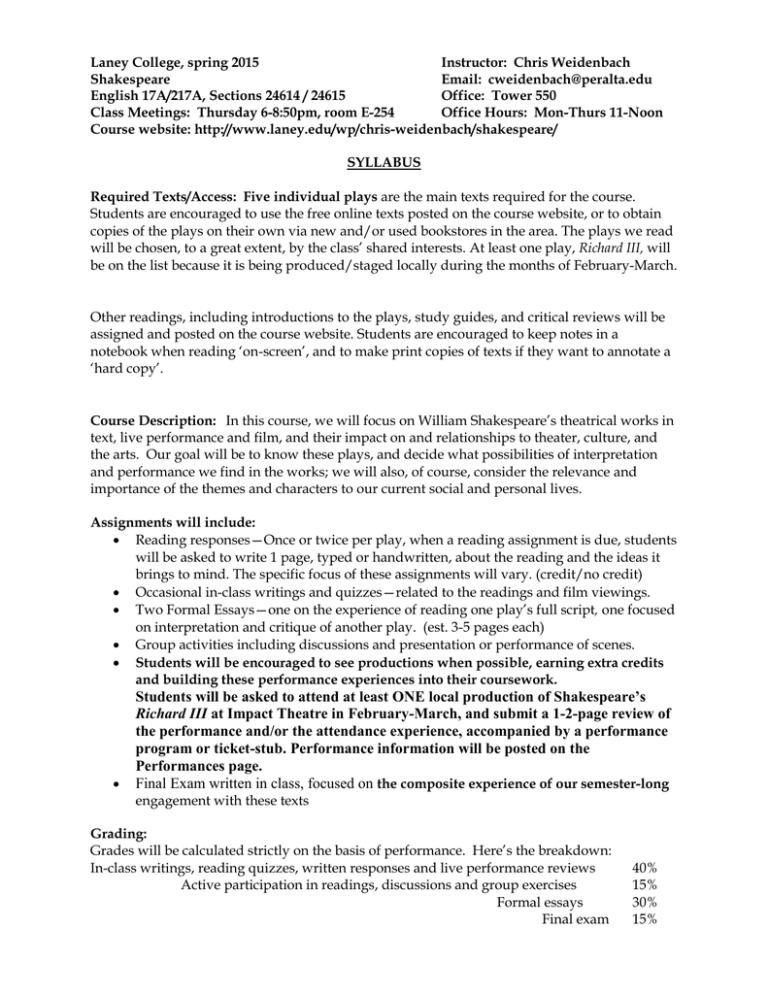
Laney College, spring 2015 Instructor: Chris Weidenbach Shakespeare Email: cweidenbach@peralta.edu English 17A/217A, Sections 24614 / 24615 Office: Tower 550 Class Meetings: Thursday 6-8:50pm, room E-254 Office Hours: Mon-Thurs 11-Noon Course website: http://www.laney.edu/wp/chris-weidenbach/shakespeare/ SYLLABUS Required Texts/Access: Five individual plays are the main texts required for the course. Students are encouraged to use the free online texts posted on the course website, or to obtain copies of the plays on their own via new and/or used bookstores in the area. The plays we read will be chosen, to a great extent, by the class’ shared interests. At least one play, Richard III, will be on the list because it is being produced/staged locally during the months of February-March. Other readings, including introductions to the plays, study guides, and critical reviews will be assigned and posted on the course website. Students are encouraged to keep notes in a notebook when reading ‘on-screen’, and to make print copies of texts if they want to annotate a ‘hard copy’. Course Description: In this course, we will focus on William Shakespeare’s theatrical works in text, live performance and film, and their impact on and relationships to theater, culture, and the arts. Our goal will be to know these plays, and decide what possibilities of interpretation and performance we find in the works; we will also, of course, consider the relevance and importance of the themes and characters to our current social and personal lives. Assignments will include: Reading responses—Once or twice per play, when a reading assignment is due, students will be asked to write 1 page, typed or handwritten, about the reading and the ideas it brings to mind. The specific focus of these assignments will vary. (credit/no credit) Occasional in-class writings and quizzes—related to the readings and film viewings. Two Formal Essays—one on the experience of reading one play’s full script, one focused on interpretation and critique of another play. (est. 3-5 pages each) Group activities including discussions and presentation or performance of scenes. Students will be encouraged to see productions when possible, earning extra credits and building these performance experiences into their coursework. Students will be asked to attend at least ONE local production of Shakespeare’s Richard III at Impact Theatre in February-March, and submit a 1-2-page review of the performance and/or the attendance experience, accompanied by a performance program or ticket-stub. Performance information will be posted on the Performances page. Final Exam written in class, focused on the composite experience of our semester-long engagement with these texts Grading: Grades will be calculated strictly on the basis of performance. Here’s the breakdown: In-class writings, reading quizzes, written responses and live performance reviews Active participation in readings, discussions and group exercises Formal essays Final exam 40% 15% 30% 15% Students will always receive a grade based on these percentages, but students who exhibit strong engagement in the course may receive a higher grade. The final grade will be based on the scale of 90-100=A, 80-89=B, 70-79=C, 60-69=D, and 0-59=F. Attendance: Students are expected to attend class regularly and punctually! This is the way to keep the course equitable for everyone, maintain a robust, stimulating pace, and build a classroom community free from resentment. Students who miss a fourth class will be subject to a one-letter grade reduction, and additional absences my earn further deductions. Late arrivals and early departures will be ‘added up’ accordingly. Due Dates: Since most writing assignments are intended to be shared with classmates on the days they are due, all readings, reading responses, essay drafts and essays are due on the dates posted. Assignment due dates will be firm. If, due to genuine illness or emergency, a student must submit an assignment or essay after the due date, the instructor may accept it, but provide no written feedback on the assignment other than a score or indication of credit. Classroom Decorum: Normal academic guidelines will hold sway in this course regarding respectful demeanor by all individuals toward each other. This demeanor especially includes respecting each other’s discussion space—not hogging a discussion, ‘cross-talking’, or interrupting someone who is speaking. Other courtesies will be expected of all students, such as not eating or drinking anything other than water in the classroom, and ensuring that any electronic devices, such as cell phones, pagers, game machines, hand-held organizers a la Blackberries, electronic dictionaries, and music players are either turned off completely or set to operate noiselessly. The regular use of music players, cell phones and other communications devices is prohibited during class meetings. In terms of emergency needs, students are asked to set phones to operate noiselessly, and to answer any emergency calls outside the classroom. Assigned Readings and Film Viewings—tentative weekly schedule: Play 1: Jan-Feb Play 2: Feb-March Play 3: March Spring Break: March 30-April 4 Play 4: April Play 5: April-May Final exam written in class: May 14

